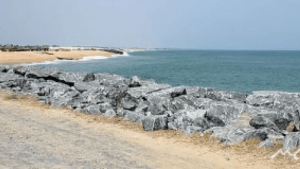Ghana needs to build resilient coastal and fishing communities
 The recent disasters occurring in parts of Accra like James Town, Bortianor, Tsokomey and Ada areas as a result of coastal flooding have left coastal dwellers, particularly fisher folks, very vulnerable.
The recent disasters occurring in parts of Accra like James Town, Bortianor, Tsokomey and Ada areas as a result of coastal flooding have left coastal dwellers, particularly fisher folks, very vulnerable.
These events occur periodically during extremely high tides and also when there are high waves and storm events at sea. Climate change resulting in rising air and water temperatures is leading to rising sea levels.
Unfortunately, rising seas means these events are likely to increase in severity and frequency in the upcoming years and over the next decades.
Consequently, Ghana needs integrated coastal zone management programmes to deal with these recurring events.
While fishermen and news reports call these events “tidal waves”, these are technically not tidal waves. Some fishermen even attributed this to bad fishing practices.
True tidal waves, or “tidal bores” occur in a limited number of places around the world and are generated from daily changes in tides that cause surges of water to roll into a semi-enclosed bay.
The term ‘tidal waves’ is used in some instances to describe tsunamis, caused from undersea quakes, something that is rare if almost non-existent in West Africa.
Storm surges are usually associated with hurricanes, typhoons and tropical cyclones in the Atlantic Ocean for instance.
These storm surges could come on very quickly and could increase sea level from a few centimeters to several meters in height. If coupled with high tide events, the surge moves and floods low lying coastal areas could seem almost like a tsunami with a rapid rise of water in minutes and currents of several km/hr in speed and also very dangerous for any person or property caught in their path.
On-going Interventions on Coastal Zone Management
The Sustainable Fisheries Management Project (SFMP), is a five-year US Government Feed the Future Initiative that has been promoting the need for improved coastal planning and management along Ghana’s coastline and providing capacity development support to Town and Country Planning in the Central and Western Regions in this regard.
USAID/Ghana SFMP is a fisheries food security project funded by the American People and works collaboratively with the Ministry of Fisheries and Aquaculture Development to rebuild targeted marine fisheries stocks through the adoption of sustainable practices and exploitation levels.
SFMP, University of Cape Coast and University of Ghana, jointly organised a two-day workshop in June to highlight this problem of coastal flooding and events that occurred in Keta and the Western Region earlier in the year.
The workshop report provides overviews of projects working on these issues and summaries of presentations on a range of options for flood prone coastal areas.
Mitigation and Adaptation to Climate Change and Disaster Preparedness
It is highly evident that Ghana needs a coastal zone management programme that could address critical issues of coastal erosion and frequent flooding events and other coastal development challenges.
Fishermen and women need to have access to and be close to the shoreline to conduct their business, often in river mouths as well; so these communities are in part by necessity, located in highly vulnerable and high disaster risk areas.
Thus, if we are interested in the well-being of fishing communities as a whole, fisheries development programmes should be supportive as well of developing resilient communities that could cope and assist them to adapt to these problems.
Next possible wave events
It is expected that the next exceptionally high spring tide events which is a much higher tide would occur from October 15- October 19, and on November 13- November 14, and on December 12- December 15, all at full moon phases.
These are exceptionally high spring tide events of the year and if associated with strong winds and waves, could result in more flooding events.
The last time tides were as high as these were in the March – April period, earlier this year, experts have said.
By Lydia Asamoah & Brian Crawford
Source : GNA
